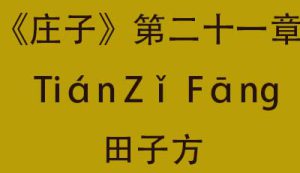The Chapter 21 of Zhuangzi ( “Tian Zifang”)

Zhuangzi’s “Tian Zifang” – A Chill Chat About Life, Death & Letting Go
So, you’ve heard of Zhuangzi, right? The ancient Chinese philosopher who’s all about going with the flow, rejecting rigid rules, and laughing at life’s absurdities? Well, Chapter 21, “Tian Zifang”, is another gem from his wild mind. It’s not as famous as the “Butterfly Dream” or the “Happy Fish” debate, but it’s packed with deep (and sometimes weird) wisdom.
This chapter is named after Tian Zifang, a disciple of Confucius who pops up in a few stories. But don’t let that fool you—this isn’t some boring Confucian lecture. Instead, Zhuangzi uses conversations (some real, some probably made up) to challenge our usual way of thinking.
What’s the Big Idea?
If I had to sum up “Tian Zifang” in one sentence, it’d be:
“Stop trying so hard. Life’s already happening without your control, so relax and let it unfold.”(Is this a theoretical justification for the so-called “lying flat”?)
Sounds simple, right? But Zhuangzi loves taking this idea to extremes—like questioning why we fear death, why we worship authority, and why we stress over things that don’t really matter.
Let’s break it down with some of the best bits.
1. The Useless Teacher (Or: Why Trying Too Hard Backfires)
The chapter opens with a story about Duke Wen of Wei. He’s obsessed with studying ancient wisdom, trying to become the perfect ruler. Then this old sage, Uncle Crazy Chariot (yep, that’s his name), shows up and basically says:
“Bro, you’re working way too hard. The best rulers don’t force things—they let things happen naturally. You think reading all those books makes you wise? Nah. Real wisdom is effortless.”
This is classic Zhuangzi. He hates rigid learning because it makes people stiff, pretentious, and disconnected from the natural flow of life. Instead, he praises people who don’t overthink—like artists, butchers, or even madmen who just do things without stressing.
2. The True Master Doesn’t “Teach” (Because You Already Know)
Next, we meet Tian Zifang himself, chatting with Duke Wei. The Duke asks:
“Hey, I’ve heard the best teachers are super strict and disciplined. What’s your take?”
Tian Zifang laughs and says:
“Nah, the real masters don’t ‘teach’ at all. They just are. A true sage doesn’t need to lecture—their presence alone wakes people up.”
This is another big theme in Zhuangzi: True wisdom isn’t about memorizing rules; it’s about unlearning all the junk society forces on you. The best teacher isn’t the one shouting instructions—it’s the one who helps you remember what you already know deep down.
3. Death? Meh. It’s Just Another Change
One of the wildest parts of “Tian Zifang” is when Zhuangzi talks about death. Most people freak out about dying, right? But Zhuangzi’s like:
“Why? You weren’t upset before you were born, so why panic about returning to the same state?”
He tells a story about Laozi’s funeral (yes, the famous Taoist sage). When Laozi dies, his friend Qin Shi shows up, gives a quick shout into the coffin (“Yo, Laozi! You escaped life’s burdens! Lucky you!”), and leaves. No crying, no drama.
Why? Because in Zhuangzi’s view, death isn’t an end—it’s just another transformation, like seasons changing or clouds shifting shape. Fighting it is as pointless as a river arguing with the ocean.
4. Forget Fame—Nobody Really Cares About You
Another hilarious (and kinda brutal) story involves Confucius (who Zhuangzi loves to roast). Confucius meets a weird, ragged-looking dude named “The True Man of Lu”. This guy doesn’t care about reputation, money, or even basic hygiene.
Confucius, being Mr. Rules, is shocked:
“Dude, don’t you want people to respect you?”
The True Man just shrugs:
“Respect? Disrespect? It’s all the same. I live how I want.”
Zhuangzi’s point? Most of our stress comes from worrying what others think. But in the grand scheme, nobody’s really judging you—they’re too busy worrying about themselves!
5. The Best Life is Effortless (Like a Bird Flying or Fish Swimming)
The chapter wraps up with a conversation between Zhuangzi and a logician (a guy who loves debates). The logician says:
“Your philosophy sounds lazy. Shouldn’t we try to be good?”
Zhuangzi replies:
“Does a bird try to fly? Does a fish try to swim? No—they just do it. Forcing yourself to ‘be good’ is like a fish climbing a tree—pointless and exhausting.”
This is the core of wu-wei (effortless action)—the idea that the best way to live is without struggle, like nature itself.
Final Thoughts: Why “Tian Zifang” Still Matters
So, why read this 2,300-year-old chapter today? Because Zhuangzi’s questions still hit hard:
- Why do we stress over things we can’t control?
- Why do we care so much about status and approval?
- What if death isn’t scary, just… unknown?
Zhuangzi doesn’t give neat answers. Instead, he plays with ideas, making us laugh while also shaking up our beliefs.
Maybe that’s the real lesson: Life’s too weird to take seriously. Just relax and enjoy the ride.
TL;DR? Here’s “Tian Zifang” in 3 Lines:
- Stop forcing things—wisdom comes when you stop trying so hard.
- Death, fame, rules? They’re all illusions—don’t let them stress you.
- Live like nature—effortless, spontaneous, and free.
And if that doesn’t convince you, remember: Even Zhuangzi would probably say, “Eh, don’t overthink it.”
